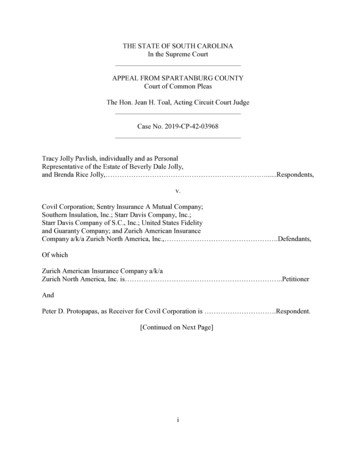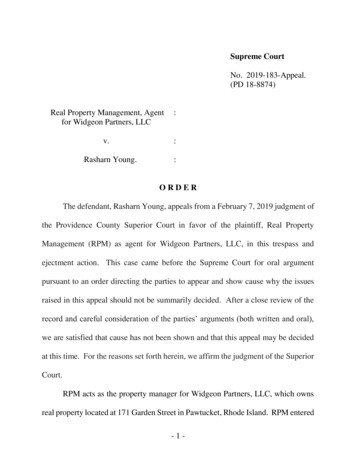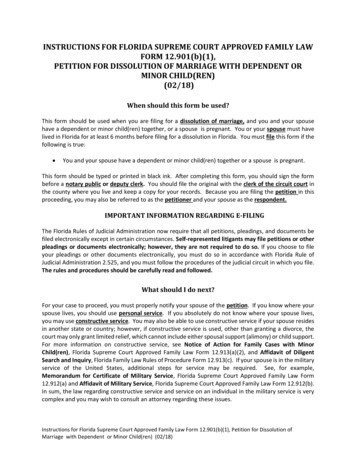
Transcription
INSTRUCTIONS FOR FLORIDA SUPREME COURT APPROVED FAMILY LAWFORM 12.901(b)(1),PETITION FOR DISSOLUTION OF MARRIAGE WITH DEPENDENT ORMINOR CHILD(REN)(02/18)When should this form be used?This form should be used when you are filing for a dissolution of marriage, and you and your spousehave a dependent or minor child(ren) together, or a spouse is pregnant. You or your spouse must havelived in Florida for at least 6 months before filing for a dissolution in Florida. You must file this form if thefollowing is true: You and your spouse have a dependent or minor child(ren) together or a spouse is pregnant.This form should be typed or printed in black ink. After completing this form, you should sign the formbefore a notary public or deputy clerk. You should file the original with the clerk of the circuit court inthe county where you live and keep a copy for your records. Because you are filing the petition in thisproceeding, you may also be referred to as the petitioner and your spouse as the respondent.IMPORTANT INFORMATION REGARDING E-FILINGThe Florida Rules of Judicial Administration now require that all petitions, pleadings, and documents befiled electronically except in certain circumstances. Self-represented litigants may file petitions or otherpleadings or documents electronically; however, they are not required to do so. If you choose to fileyour pleadings or other documents electronically, you must do so in accordance with Florida Rule ofJudicial Administration 2.525, and you must follow the procedures of the judicial circuit in which you file.The rules and procedures should be carefully read and followed.What should I do next?For your case to proceed, you must properly notify your spouse of the petition. If you know where yourspouse lives, you should use personal service. If you absolutely do not know where your spouse lives,you may use constructive service. You may also be able to use constructive service if your spouse residesin another state or country; however, if constructive service is used, other than granting a divorce, thecourt may only grant limited relief, which cannot include either spousal support (alimony) or child support.For more information on constructive service, see Notice of Action for Family Cases with MinorChild(ren), Florida Supreme Court Approved Family Law Form 12.913(a)(2), and Affidavit of DiligentSearch and Inquiry, Florida Family Law Rules of Procedure Form 12.913(c). If your spouse is in the militaryservice of the United States, additional steps for service may be required. See, for example,Memorandum for Certificate of Military Service, Florida Supreme Court Approved Family Law Form12.912(a) and Affidavit of Military Service, Florida Supreme Court Approved Family Law Form 12.912(b).In sum, the law regarding constructive service and service on an individual in the military service is verycomplex and you may wish to consult an attorney regarding these issues.Instructions for Florida Supreme Court Approved Family Law Form 12.901(b)(1), Petition for Dissolution ofMarriage with Dependent or Minor Child(ren) (02/18)
If personal service is used, your spouse has 20 days to answer after being served with your petition. Yourcase will then generally proceed in one of the following three ways:DEFAULT. If after 20 days, your spouse has not filed an answer, you may file a Motion for Default, FloridaSupreme Court Approved Family Law Form 12.922(a), with the clerk of court. Then, if you have filed allof the required papers, you may contact the clerk, family law intake staff, or judicial assistant to set afinal hearing. You must notify your spouse of the hearing by using a Notice of Hearing (General), FloridaSupreme Court Approved Family Law Form 12.923, or other appropriate notice of hearing form.UNCONTESTED. If your spouse files an answer that agrees with everything in your petition or an answerand waiver, and you have complied with mandatory disclosure and filed all of the required papers, youmay contact the clerk, family law intake staff, or judicial assistant to set a final hearing. You must notifyyour spouse of the hearing by using a Notice of Hearing (General), Florida Supreme Court ApprovedFamily Law Form 12.923, or other appropriate notice of hearing form.CONTESTED. If your spouse files an answer or an answer and counterpetition, which disagrees with ordenies anything in your petition, and you are unable to settle the disputed issues, you should file a Noticefor Trial, Florida Supreme Court Approved Family Law Form 12.924, after you have complied withmandatory disclosure and filed all of the required papers. Some circuits may require the completion ofmediation before a final hearing may be set. You should contact the clerk, family law intake staff, orjudicial assistant for instructions on how to set your case for trial (final hearing). If your spouse files ananswer and counterpetition, you should answer the counterpetition within 20 days using an Answer toCounterpetition, Florida Supreme Court Approved Family Law Form 12.903(d).Where can I look for more information?Before proceeding, you should read General Information for Self-Represented Litigants found at thebeginning of these forms. The words that are in bold underline in these instructions are defined there.For further information, see chapter 61, Florida Statutes.IMPORTANT INFORMATION REGARDING E-SERVICE ELECTIONAfter the initial service of process of the petition or supplemental petition by the Sheriff or certifiedprocess server, the Florida Rules of Judicial Administration now require that all documents required orpermitted to be served on the other party must be served by electronic mail (e-mail) except in certaincircumstances. You must strictly comply with the format requirements set forth in the Rules of JudicialAdministration. If you elect to participate in electronic service, which means serving or receiving pleadingsby electronic mail (e-mail), or through the Florida Courts E-Filing Portal, you must review Florida Rule ofJudicial Administration 2.516. You may find this rule at www.flcourts.org through the link to the Rules ofJudicial Administration provided under either Family Law Forms: Getting Started, or Rules of Court in theA-Z Topical Index.SELF-REPRESENTED LITIGANTS MAY SERVE DOCUMENTS BY E-MAIL; HOWEVER, THEY ARE NOTREQUIRED TO DO SO. If a self-represented litigant elects to serve and receive documents by e-mail, theprocedures must always be followed once the initial election is made.Instructions for Florida Supreme Court Approved Family Law Form 12.901(b)(1), Petition for Dissolution ofMarriage with Dependent or Minor Child(ren) (02/18)
To serve and receive documents by e-mail, you must designate your e-mail addresses by using theDesignation of Current Mailing and E-mail Address, Florida Supreme Court Approved Family Law Form12.915, and you must provide your e-mail address on each form on which your signature appears. PleaseCAREFULLY read the rules and instructions for: Certificate of Service (General), Florida Supreme CourtApproved Family Law Form 12.914; Designation of Current Mailing and E-mail Address, Florida SupremeCourt Approved Family Law Form 12.915; and Florida Rule of Judicial Administration 2.516.Special notes.If you do not have the money to pay the filing fee, you may obtain an Application for Determination ofCivil Indigent Status from the clerk, fill it out, and the clerk will determine whether you are eligible to havefiling fees deferred.If you want to keep your address confidential because you are the victim of sexual battery, aggravatedchild abuse, aggravated stalking, harassment, aggravated battery, or domestic violence, do not enter theaddress, telephone, and fax information at the bottom of this form. Instead, file a Request for ConfidentialFiling of Address, Florida Supreme Court Approved Family Law Form 12.980(h).With this form, you must also file the following: Uniform Child Custody Jurisdiction and Enforcement Act (UCCJEA) Affidavit, Florida SupremeCourt Approved Family Law Form 12.902(d).Child Support Guidelines Worksheet, Florida Family Law Rules of Procedure Form 12.902(e), ifyou are asking that child support be ordered in the final judgment. (If you do not know yourspouse’s income, you may file this worksheet after your spouse’s financial affidavit has beenserved on you.)Affidavit of Corroborating Witness, Florida Supreme Court Approved Family Law Form 12.902(i)OR photocopy of current Florida driver’s license, Florida identification card, or voter’s registrationcard (issue date of copied document must be at least six months before date case is actually filedwith the clerk of the circuit court).Marital Settlement Agreement for Dissolution of Marriage with Dependent or Minor Child(ren),Florida Supreme Court Approved Family Law Form 12.902(f)(1), if you and your spouse havereached an agreement on any or all of the issues.Notice of Social Security Number, Florida Supreme Court Approved Family Law Form 12.902(j).Family Law Financial Affidavit, Florida Family Law Rules of Procedure Form 12.902(b) or (c). (Thismust be filed with the petition if the petitioner seeks to establish child support. Otherwise, itmust be filed within 45 days of service of the petition on the respondent.)Certificate of Compliance with Mandatory Disclosure, Florida Family Law Rules of ProcedureForm 12.932. (This must be filed within 45 days of service of the petition on the respondent, if notfiled at the time of the petition, unless you and your spouse have agreed not to exchange thesedocuments.)Parenting Plan, Florida Supreme Court Approved Family Law Form 12.995(a), (b), or (c). If theparents have reached an agreement, a signed and notarized Parenting Plan should be attached.If the parents have not reached an agreement, a proposed Parenting Plan may be filed.Parenting Plan and Time-Sharing. If you and your spouse are unable to agree on parenting arrangementsand a time-sharing schedule, a judge will decide for you as part of establishing a Parenting Plan. The judgeInstructions for Florida Supreme Court Approved Family Law Form 12.901(b)(1), Petition for Dissolution ofMarriage with Dependent or Minor Child(ren) (02/18)
will decide the parenting arrangements and time-sharing based on the child(ren)’s best interests.Regardless of whether there is an agreement, the court reserves jurisdiction to modify issues relating tothe minor child(ren).The judge may request a parenting plan recommendation or appoint a guardian ad litem in your case.This means that a neutral person will review your situation and report to the judge concerning parentingissues. The purpose of such intervention is to be sure that the best interests of the child(ren) is (are) beingserved. For more information, you may consult section 61.13, Florida Statutes.A parenting course must be completed prior to entry of the final judgment. You should contact the clerk,family law intake staff, or judicial assistant about requirements for parenting courses where you live.Listed below are some terms with which you should become familiar before completing your petition. Ifyou do not fully understand any of the terms below or their implications, you should speak with anattorney before going any further. Shared Parental ResponsibilitySole Parental ResponsibilitySupervised Time-SharingNo contactParenting PlanParenting Plan RecommendationTime-Sharing ScheduleChild Support. Both parents are required to provide financial support for their minor or dependentchild(ren); however, the court may order one parent to pay child support to the other parent. Floridahas adopted guidelines for determining the amount of child support to be paid. These guidelines arebased on the combined income of both parents and take into account the financial contributions of bothparents and the number of overnights the child(ren) spend with each parent. You must file a Family LawFinancial Affidavit, Florida Family Law Rules of Procedure Form 12.902(b) or (c), and your spouse will berequired to do the same. From your financial affidavits, you should be able to calculate the amount ofchild support that should be paid using the Child Support Guidelines Worksheet, Florida Family Law Rulesof Procedure Form 12.902(e). Because the child support guidelines take several factors into consideration,change over time, and vary from state to state, your child support obligation may be more or less thanthat of other people in seemingly similar situations.Alimony. Alimony may be awarded to a spouse if the judge finds that one spouse has an actual need forit and also finds that the other spouse has the ability to pay. If you want alimony, you must request it inwriting in the original petition. If you do not request alimony in writing before the final hearing, it iswaived (you may not request it later). You may request permanent alimony, bridge-the-gap alimony,durational alimony, , and/or rehabilitative alimony. If alimony is awarded, the judge may order periodicpayments, payments in lump sum, or both.Marital/Nonmarital Assets and Liabilities. Florida law requires an equitable distribution of maritalassets and marital liabilities. “Equitable” does not necessarily mean “equal.” Many factors, includingchild support, time-sharing, and alimony awards, may lead the court to make an unequal (but stillequitable) distribution of assets and liabilities. Nonmarital assets and nonmarital liabilities are thoseInstructions for Florida Supreme Court Approved Family Law Form 12.901(b)(1), Petition for Dissolution ofMarriage with Dependent or Minor Child(ren) (02/18)
assets and liabilities which the parties agree or the court determines belong to, or are the responsibilityof, only one of the parties. If the parties agree or the court finds an asset or liability to be nonmarital, thejudge will not consider it when distributing marital assets and liabilities.Temporary Relief. If you need temporary relief regarding temporary use of assets, temporaryresponsibility for liabilities, parental responsibility and time-sharing with child(ren), temporary childsupport, or temporary alimony, you may file a Motion for Temporary Support and Time-Sharing withDependent or Minor Child(ren), Florida Supreme Court Approved Family Law Form 12.947(a). For moreinformation, see the instructions for that form.Marital Settlement Agreement. If you and your spouse are able to reach an agreement on any or all ofthe issues, you should file a Marital Settlement Agreement for Dissolution of Marriage with Dependentor Minor Child(ren), Florida Supreme Court Approved Family Law Form 12.902(f)(1). Both of you mustsign this agreement before a notary public or deputy clerk. Any issues on which you are unable to agreewill be considered contested and settled by the judge at the final hearing.Parenting Plan. In all cases involving minor or dependent child(ren), a Parenting Plan shall be approvedor established by the court. If you and your spouse have reached an agreement, you should file one of thefollowing: Parenting Plan, Florida Supreme Court Approved Family Law Form 12.995(a), Safety-FocusedParenting Plan, Florida Supreme Court Approved Family Law Form 12.995(b), or Relocation/LongDistance Parenting Plan, Florida Supreme Court Approved Family Law Form 12.995(c), which addressesthe time-sharing schedule for the child(ren). If you have not reached an agreement, a proposed ParentingPlan may be filed. If the parties are unable to agree, a Parenting Plan will be established by the court.Final Judgment Form. These family law forms contain a Final Judgment of Dissolution of Marriage withDependent or Minor Child(ren), Florida Supreme Court Approved Family Law Form 12.990(c)(1), whichthe judge may use if your case is contested. If you and your spouse reach an agreement on all of the issues,the judge may use a Final Judgment of Dissolution of Marriage with Dependent or Minor Child(ren)(Uncontested), Florida Supreme Court Approved Family Law Form 12.990(b)(1). You should check withthe clerk, family law intake staff, or judicial assistant to see if you need to bring a final judgment with youto the hearing. If so, you should type or print the heading, including the circuit, county, case number,division, and the parties’ names, and leave the rest blank for the judge to complete at your hearing ortrial.Nonlawyer. Remember, a person who is NOT an attorney is called a nonlawyer. If a nonlawyer helps youfill out these forms, that person must give you a copy of a Disclosure from Nonlawyer, Florida Family LawRules of Procedure Form 12.900(a), before he or she helps you. A nonlawyer helping you fill out theseforms also must put his or her name, address, and telephone number on the bottom of the last page ofevery form he or she helps you complete.Instructions for Florida Supreme Court Approved Family Law Form 12.901(b)(1), Petition for Dissolution ofMarriage with Dependent or Minor Child(ren) (02/18)
IN THE CIRCUIT COURT OF THEIN AND FORJUDICIAL CIRCUIT,COUNTY, FLORIDACase No.:Division:In re: The Marriage of:,Petitioner,and,Respondent.PETITION FOR DISSOLUTION OF MARRIAGE WITHDEPENDENT OR MINOR CHILD(REN)I, {full legal name}, thePetitioner, being sworn, certify that the following statements are true:1. JURISDICTION/RESIDENCEPetitioner Respondent Both has (have) lived in Florida for at least 6 monthsbefore the filing of this Petition for Dissolution of Marriage.2. Petitioner is or is not a member of the military service.Respondent is or is not a member of the military service.3. MARRIAGE HISTORYDate of marriage: {month, day, year}Date of separation: {month, day, year} ( Please indicate if approximate)Place of marriage: {county, state, country}4. DEPENDENT OR MINOR CHILD(REN){Choose all that apply}a. Petitioner is pregnant. Baby is due on: {date}b. Respondent is pregnant. Baby is due on: {date}c. The minor (under 18) child(ren) common to both parties are:NameBirth dateFlorida Supreme Court Approved Family Law Form 12.901(b)(1), Petition for Dissolution of Marriage withDependent or Minor Child(ren) (02/18)
d. The minor child(ren) born or conceived during the marriage who are not common toboth parties are:NameBirth dateThe birth parent (s) of the above minor child(ren) is (are): {name and address}e. The child(ren) common to both parties who are 18 or older but who are dependent uponthe parties due to a mental or physical disability are:NameBirth date5. A completed Family Law Financial Affidavit, Florida Family Law Rules of Procedure Form12.902(b) or (c) {choose only one} is filed with this petition or will be timely filed.6. A completed Uniform Child Custody Jurisdiction and Enforcement Act (UCCJEA) Affidavit, FloridaSupreme Court Approved Family Law Form 12.902(d), is filed with this petition. (You mustcomplete and attach this form in a dissolution of marriage with minor child(ren)).7. A completed Notice of Social Security Number, Florida Supreme Court Approved Family LawForm 12.902(j), is filed with this petition.8. This petition for dissolution of marriage should be granted because:{Choose only one}a. The marriage is irretrievably broken.ORb. One of the parties has been adjudged mentally incapacitated for a period of 3 years priorto the filing of this petition. A copy of the Judgment of Incapacity is attached.SECTION I. MARITAL ASSETS AND LIABILITIES1. There are no marital assets or liabilities.ORFlorida Supreme Court Approved Family Law Form 12.901(b)(1), Petition for Dissolution of Marriage withDependent or Minor Child(ren) (02/18)
2. There are marital assets or liabilities. All marital and nonmarital assets and liabilities are(or will be) listed in the financial affidavits, Florida Family Law Rules of Procedure Form12.902(b) or (c), filed in this case.{Indicate all that apply}a. All marital assets and liabilities have been divided by
, Florida Supreme Court Approved Family Law Form 12.902(i) OR photocopy of current Florida driver’s license, Florida identification card, or voter’s registration card (issue date of copied document must be at least six months before date case is actually filed with the clerk of the circuit court).
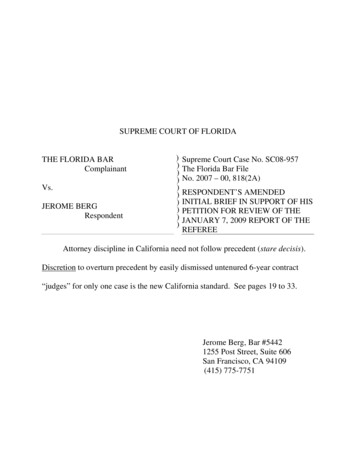
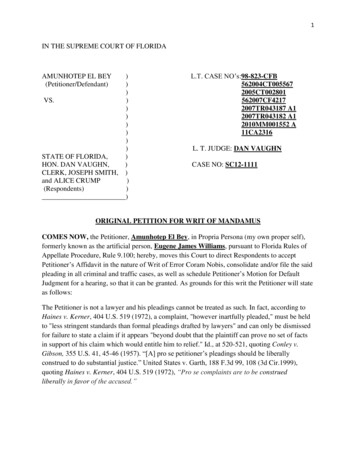
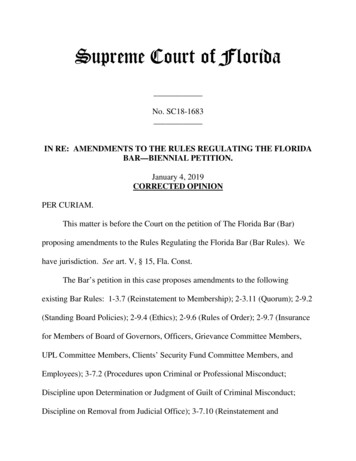
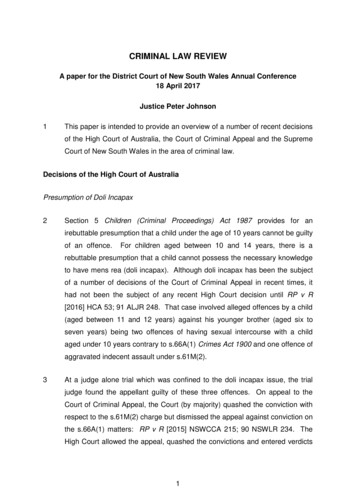
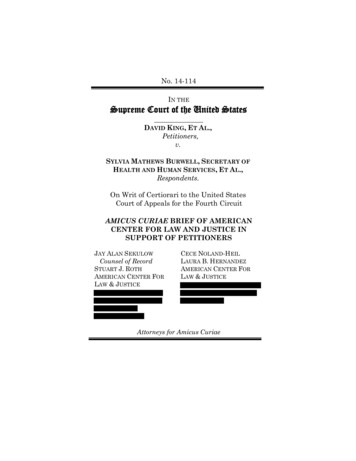
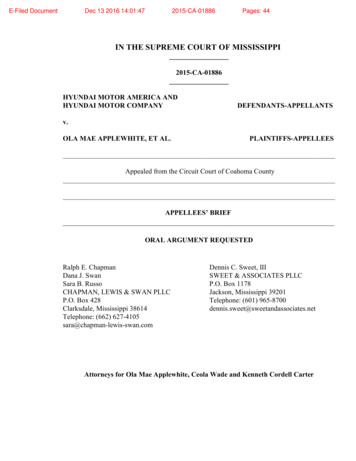
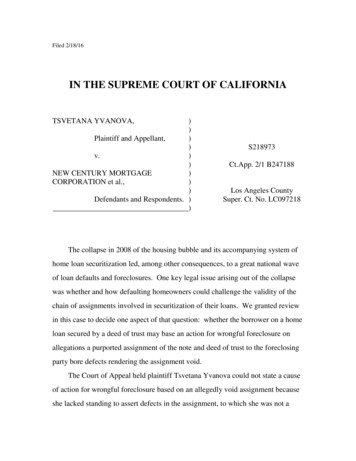
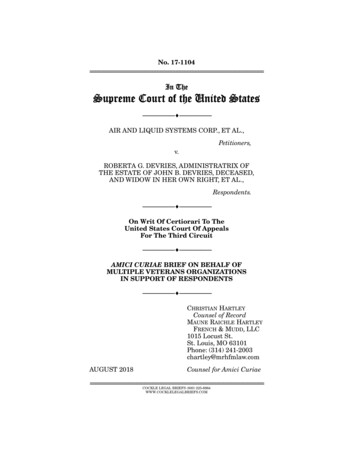
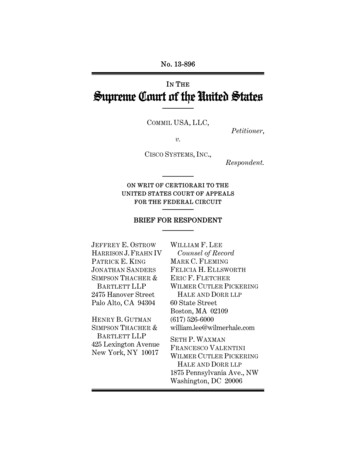
![IN THE SUPREME COURT OF T]-lE STATE OF MONTANA](/img/7/526b198c923f8.jpg)
